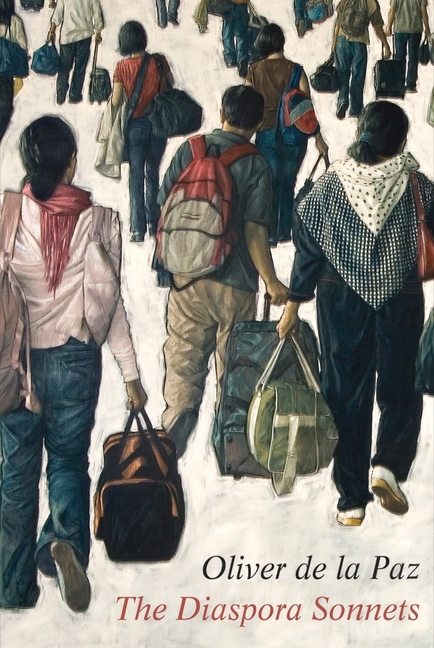I wrote my series of “Chain Migration” poems as I was starting the process of organizing The Diaspora Sonnets into a cohesive manuscript. “Chain Migration I: Airport Coin-Op Food” was the first of three poems in the series, which were written in direct response to a series of pantoums I had written to supplement the many sonnets I had included in what was becoming the book.
The manuscript at the time was overwhelmed by sonnets, and, as I was placing sonnet after sonnet adjacent to one another, I could see that the organizational strategy needed complication. To my eye the book was not progressing, or rather, the movement of the book was in a circular fashion and needed poems that would send a reader forward into a narrative trajectory. I started writing pantoums to demarcate section breaks to rectify what I saw as an imbalance in the work. I wanted to place the pantoum, which was originally a Malaysian form, against the sonnet’s Western European tradition as a subtle nod to the complications that arise when attempting to adapt to a place. As I was crafting the pantoums, I realized that my concerns in the book were primarily formal. The following questions arose—what did it mean for me, a Filipino American immigrant, to be writing in these forms? How am I contributing or challenging these traditions? As more questions about craft and tradition came about in my revision process, I realized that the primary concern of mine as I was organizing the book was that I wanted to ensure a conversation about form and a form’s meaning was present for the reader.
I wanted to investigate tradition, assimilation, and language loss, but I needed a starting point for that conversation. That’s when the lyrical ballad form of the “Chain Migration” poems came to me. There are three “Chain Migration” poems and they open each of the three sections of the book in response to the three pantoums that close each section. As I mentioned, initially I was writing pantoums which were circular and communal as was their tradition before becoming “adopted” by European traditions. The lyrical ballad as a starting point for a section implied direction for me and served as a nod to Western European epic traditions. Yet I still wanted the concerns of the epic heroes in these lyric ballads to be real people, thus challenging what was “epic worthy.”
The occasion for the poem came about as my family and I were at Boston’s Logan Airport heading towards a family reunion with my wife’s extended family. As I was ensuring that we were all together and attended to with snacks and drinks, I remembered wandering an airport with my family while we were waiting around for a similar flight years ago. I had begged my father for chips. I think it was the San Francisco airport and I was around four years old. My father rummaged around his pockets looking for change but had to go to a vendor to break a five-dollar bill. That’s the moment that’s caught in the first stanza when I write:
My father changed his cash to coins
and stuffed them in machines
to buy us food. The airport joined
my sense of father’s schemes
I wanted to write in common meter, again as a way of acknowledging the lyrical ballad’s traditional formal structure while also using that structure as a nod to the sonnets which often break their traditional structures throughout The Diaspora Sonnets. I also adhere to a loose rhyming structure with “coins” and “joined” rhyming slantwise. Later in the poem I’m much looser with the slant rhymes—rhyming “valise” with “peace” for example, but the exercise for me was much bigger than attempting to land a perfect lyrical ballad. My aims were primarily to find a poetic form that could symbolize the epic tradition while inviting me to tell a story that was much more quiet, intimate, and local. Sure, buying a kid a bag of chips may not seem like an epic tale, but why can’t it be?
My father was a young man when we left the Philippines after Ferdinand Marcos declared martial law. He was in his twenties and had very little money. I should think that weighing the decision to break a five-dollar bill and buying junk food for his kid could and should expand our notion of what is of epic and heroic concern.




